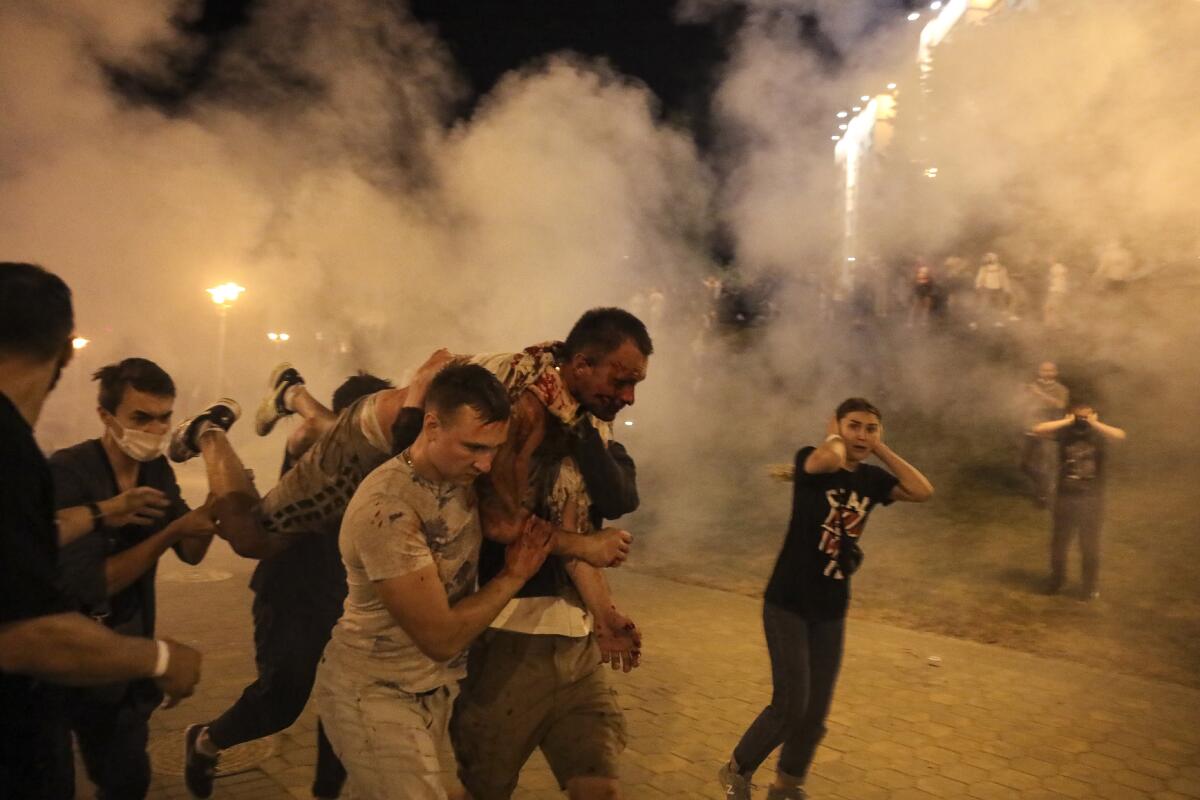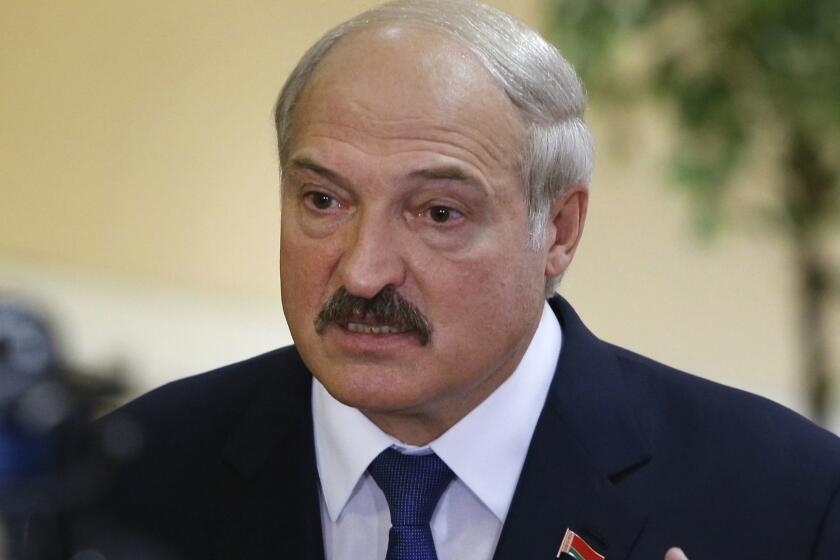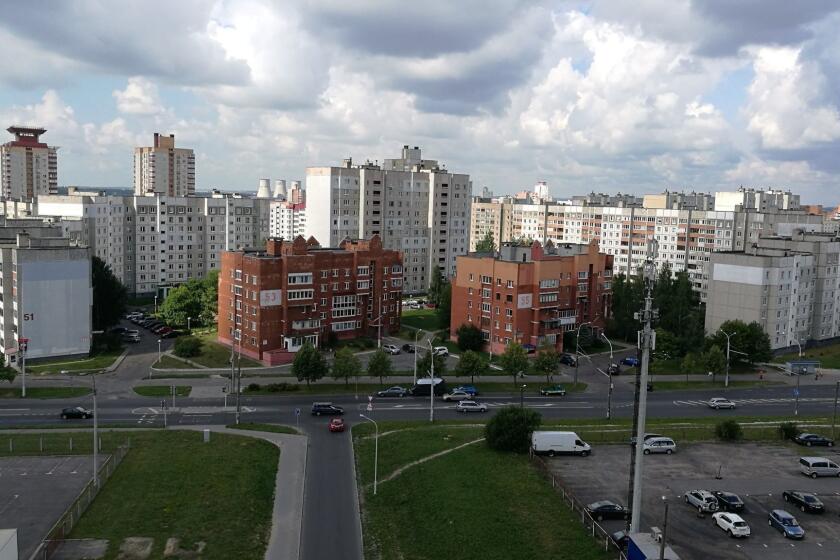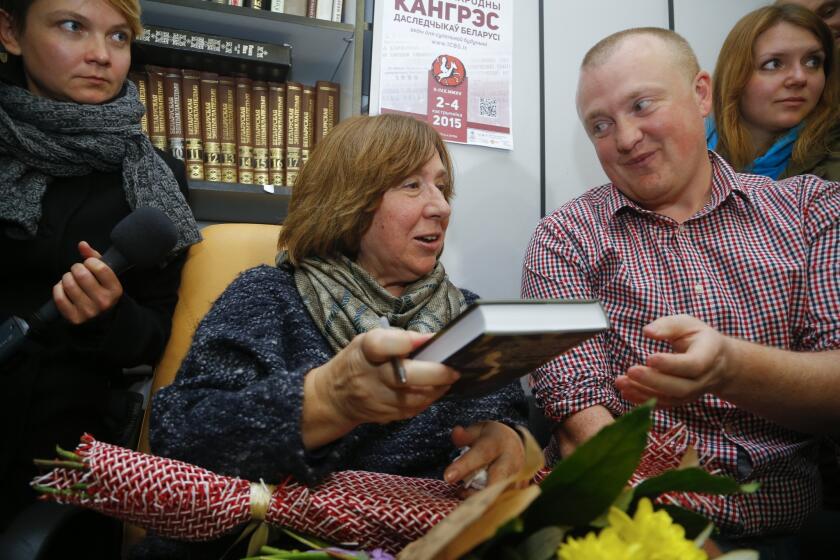Alexander Lukashenko, ‘Europe’s last dictator,’ wins sixth term in Belarus election

- Share via
MINSK, Belarus — Election officials in Belarus said Monday that President Alexander Lukashenko — often referred to as “Europe’s last dictator” — had won his sixth consecutive term, taking more than 80% of the vote amid protests fueled by frustration with the country’s deteriorating economy, years of political repression and the authoritarian incumbent’s cavalier brushoff of the coronavirus threat.
Human rights groups said one person was killed — which authorities denied — and dozens were injured in a police crackdown on protests that followed Sunday’s presidential election.
The country’s central election commission said that, with all ballots counted, Lukashenko, who has led Belarus for 26 years, took 80.23% of the vote and his main opposition challenger, Sviatlana Tsikhanouskaya, only 9.9%.
Opposition supporters believed the election results were rigged and planned to gather in Minsk, the capital, for more protests Monday evening.
“We don’t recognize these results,” Tsikhanouskaya, a former English teacher and political novice, told reporters Monday.
“According to the data we receive from precincts, we won, and this corresponds with what we saw at polling stations,” she said. “People stood in lines at polling stations in order to vote for Tsikhanouskaya. I believe my own eyes rather than the data of the central election commission.”
The authoritarian president of Belarus has rejected a prospective law against domestic violence as Western “nonsense,” saying that physical punishment could be “useful” in raising children.
Thousands of people took to the streets in a number of Belarusian cities and towns Sunday night, protesting the early count suggesting Lukashenko’s landslide victory. They faced rows of riot police in black uniforms, who moved quickly to disperse the demonstrators, firing flash-bang grenades and beating them with truncheons.
The brutal crackdown followed a tense campaign that saw massive rallies against Lukashenko, who has ruled the ex-Soviet nation with an iron fist for 26 years. Lukashenko has not yet commented on the results or the protests, only saying Monday that “the people” should be the cornerstone of any politics, according to the state news agency Belta.
According to the Viasna human rights group, more than 200 protesters were detained, dozens sustained injuries and one died as the result of clashes with police.
“What has happened is awful,” Tsikhanouskaya told reporters Sunday.
It’s a long way from Silicon Valley to Minsk.
The Interior Ministry said Monday no one was killed during the protests and called reports about a fatality “an absolute fake.” According to officials, 89 people were injured during the protests, including 39 law enforcement officers, and some 3,000 people were detained.
On Monday morning, Belarus’ Investigative Committee opened a criminal probe into mass riots and violence toward police officers.
An Associated Press journalist was beaten by police and treated at a hospital.
At Minsk’s Hospital No. 10, an AP reporter saw a dozen ambulances delivering protesters with fragmentation wounds and cuts from stun grenades and other injuries.
When President Trump was criticized recently for not reacting quickly enough to incidents of anti-Semitism, his son-in-law Jared Kushner came to the president’s defense by telling the story of his own Jewish grandmother’s escape from Nazi occupation in the Soviet Union.
European officials urged Belarusian authorities Sunday to adhere to standards of democracy and respect civil rights.
Lithuanian Foreign Minister Linas Linkevicius told the BNS news agency Monday that “it’s difficult to call this election transparent, democratic and free, regrettably.” Poland’s Foreign Ministry issued a statement on Monday morning saying that “the harsh reaction of the law enforcement forces, the use of force against peaceful protesters, and arbitrary arrests are unacceptable.”
Russian President Vladimir Putin, in the meantime, congratulated Lukashenko on his win Monday, and so did the president of Kazakhstan, Kassym-Jomart Tokayev. The results of the vote “indicate the popular support” of Lukashenko’s rule, Tokayev said.
Ukrainian President Volodymyr Zelensky said in a Facebook post Monday that it was “obvious that not everyone in the country agrees with the announced preliminary election results. And, as we know, any legitimacy arises solely from public trust.” He urged Minsk to refrain from violence and called for dialogue with the opposition.
The relationship between Russia and Belarus has never been an easy one.
Two prominent opposition challengers were denied places on the ballot, but Tsikhanouskaya, the wife of a jailed opposition blogger, managed to unite opposition groups and draw tens of thousands to her campaign rallies, tapping growing anger over a stagnant economy and fatigue with Lukashenko’s autocratic rule.
Lukashenko was defiant as he voted earlier in the day, warning that the opposition would meet a tough response.
“If you provoke, you will get the same answer,” he said. “Do you want to try to overthrow the government, break something, wound, offend and expect me or someone to kneel in front of you and kiss them and the sand onto which you wandered? This will not happen.”
The Organization for Security and Cooperation in Europe, whose assessments of elections are widely regarded as authoritative, was not invited to send observers.
As news that Belarus’ Svetlana Alexievich had been awarded the Nobel Prize for literature spread across Minsk on Thursday, perhaps nowhere was the sense of pride more palpable than at Lohninau, a small, Belarusian language bookstore tucked in an alley off Victory Square.
Tsikhanouskaya had crisscrossed the country, tapping into public frustration with a worsening economy and Lukashenko’s swaggering response to the COVID-19 pandemic.
Belarus, a country of 9.5 million people, has reported more than 68,500 coronavirus cases and 580 deaths, but critics have accused authorities of manipulating the figures to downplay the death toll.
Lukashenko dismissed the virus as “psychosis” and declined to apply measures to stop its spread, saying a lockdown would have doomed the already weak economy. He announced last month that he had been infected but had no symptoms and recovered quickly, allegedly thanks to playing sports.
More to Read
Sign up for Essential California
The most important California stories and recommendations in your inbox every morning.
You may occasionally receive promotional content from the Los Angeles Times.
















